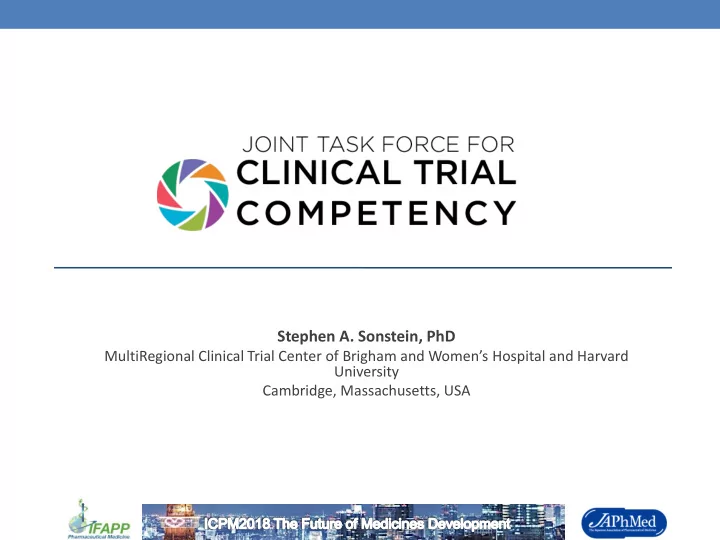

Stephen A. Sonstein, PhD MultiRegional Clinical Trial Center of Brigham and Women’s Hospital and Harvard University Cambridge, Massachusetts, USA
2 ICPM2018 Disclosure of Conflict of Interest (COI) • The author has no Conflict of Interest (COI) with regard to the presentation.
3 ICPM2018 Clinical Research Professional Shortages • In the last six years, pharmaceutical and biotech companies removed roughly 150,000 jobs from their workforce as they shifted more R&D activities to CROs. - Centerwatch, 2015 • At least 10,000 open CRA Positions in the US as of June, 2015 – DIA, 2015 • Number of physicians doing research has declined 5.5% since 2003 and the number in their 60’s and 70’s exceeds the number in their 50’s and below – NIH, 2012 • Many nurses would like to move into Clinical Research Coordinator positions, but salaries are lower and they really do not have CR training in nursing school • As number of clinical trials increases and number of sites per trial increases there is a tremendous shortage of competent clinical research coordinators
4 ICPM2018 Status of the pipeline of new personnel? • Still primarily on-the-job training focused on specific role requirements as opposed to defined core competencies • Supplemented by recurring GCP training with little understanding of the underlying science of medicines development or regulatory perspectives – JTF, 2017 • The current “on the job” training system in place to train and mentor CRAs and CRC’s is inadequate to meet a growing demand for new skills and talents – ACRP, 2016 • No requirement for academic preparation or professional certification • Graduates of academic programs in clinical research have difficulty obtaining position due to arbitrary experiential requirement.
5 ICPM2018 JTF origin • Organized under the sponsorship of MRCT/ACRES at Harvard University conference (2013) • Supported by DIA, ACRP and MAGI • Included representatives from industry, academia and nonprofit organizations • Agreed to work toward aligning and harmonizing the many more focused statements relating to core competencies for clinical research professionals into a single, high-level set of standards which could be adopted globally • serve as a framework for defining professional competence throughout the clinical research enterprise
6 ICPM2018 Joint Task Force for Clinical Trial Competency Representatives met in person or via TC during the period October 2013-June 2015 JTF Coordinators: S. Sonstein and R. Li
7 ICPM2018 JTF Framework – Competency Domains for the Clinical Research Professional Sonstein, S.A., Seltzer, J., Li, R., Jones, C.T., Silva, H., Daemen, E. (2014, June). Moving from compliance to competency: A harmonized core competency framework for the clinical research professional . Clinical Researcher . 28(3); 17-23 • Applied Clinical Trials . May 28, 2014 • Journal of Clinical Research Best Practice s,10(6); 1-12. • CenterWatch Whitepapers , June, 2014.
8 ICPM2018 Examples of Utilization of JTF Framework • ACRP – organized annual meeting tracks and professional certification examination based on JTF Framework • Duke University – restructured research job classifications based on competencies. Went from over hundred to fewer than 20. Restructured promotion criteria • Takeda Pharmaceuticals – reorganized internal training programs based on competency framework • CTSA adopted core competency framework as basis for clinical investigator training program • CAAHEP sponsored accreditation of academic programs in clinical research. Standards based on JTF framework • The UK National Institute for Health Research (NIHR) Clinical Research Network (CRN) has used the JTF Framework in a clinical research workforce development initiative called the Integrated Workforce Framework (IWF).
9 ICPM2018 Current and Future JTF activities • JTF website – http://clinicaltrialcompetency.org • Broaden the stakeholders utilizing competencies to comprise all team members including statisticians, data managers, physicians, patient advocates • JTF Framework 2.0 • Reduced overlap across domains. Uses objective, measurable language. Gives examples of specific skills that need to be mastered for each competency statement. • Add leveling (or tiers) of competencies • Obviously there are entry, mid and expert levels of competency • Personal competency portfolios • Individuals can apply for employment or promotion based on documented competencies instead of “length of time of employment” • Development of Metrics to show impact of integration of competency framework in to the clinical research enterprise
10 ICPM2018 JTF Vision • To develop a universally applicable, globally relevant harmonized competency framework for clinical research professionals • To align competency-based efforts (e.g., education, training, and workforce development) across the clinical research enterprise • To identify knowledge, skills, and attitudes that are essential for the successful, ethical, and safe conduct of clinical trials • To build a framework that can adapt to meet the needs of clinical researchers as the discipline evolves and advances • To facilitate the success and development of current and aspiring clinical research professionals • To align stakeholders across the clinical research enterprise — including academia, industry, government, non-profits and professional societies
Recommend
More recommend